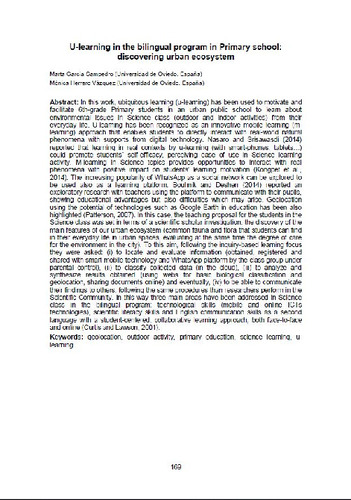U-learning in the bilingual program in Primary school: discovering urban ecosystem
Subject:
Science learning
Primary education
English bilingual program
U-learning
Outdoor activity
Geolocation
Publication date:
Editorial:
Universidad de Alcalá, Servicio de Publicaciones
Serie:
UAH Obras colectivas Ciencias de la Educación;23
Descripción física:
Abstract:
In this work, ubiquitous learning (u-learning) has been used to motivate and facilitate 6th-grade Primary students in an urban public school to learn about environmental issues in Science class (outdoor and indoor activities) from their everyday life. U-learning has been recognized as an innovative mobile learning (m-learning) approach that enables students to directly interact with real-world natural phenomena with supports from digital technology. Nasaro and Srisawasdi (2014) reported that learning in real contexts by u-learning (with smart-phones, tablets…) could promote students´ self-efficacy, perceiving ease of use in Science learning activity. M-learning in Science topics provides opportunities to interact with real phenomena with positive impact on students’ learning motivation (Kongpet et al., 2014). The increasing popularity of WhatsApp as a social network can be explored to be used also as a learning platform. Bouhnik and Deshen (2014) reported an exploratory research with teachers using the platform to communicate with their pupils, showing educational advantages but also difficulties which may arise. Geolocation using the potential of technologies such as Google Earth in education has been also highlighted (Patterson, 2007). In this case, the teaching proposal for the students in the Science class was set in terms of a scientific scholar investigation: the discovery of the main features of our urban ecosystem (common fauna and flora that students can find in their everyday life in urban spaces, evaluating at the same time the degree of care for the environment in the city). To this aim, following the inquiry-based learning focus they were asked: (i) to locate and evaluate information (obtained, registered and shared with smart-mobile technology and WhatsApp platform by the class group under parental control), (ii) to classify collected data (in the cloud), (iii) to analyze and synthesize results obtained (using webs for basic biological classification and geolocation, sharing documents online) and eventually, (iv) to be able to communicate their findings to others, following the same procedures than researchers perform in the Scientific Community. In this way three main areas have been addressed in Science class in the bilingual program: technological skills (mobile and online ICTs technologies), scientific literacy skills and English communication skills as a second language with a student-centered, collaborative learning approach, both face-to-face and online (Curtis and Lawson, 2001).
In this work, ubiquitous learning (u-learning) has been used to motivate and facilitate 6th-grade Primary students in an urban public school to learn about environmental issues in Science class (outdoor and indoor activities) from their everyday life. U-learning has been recognized as an innovative mobile learning (m-learning) approach that enables students to directly interact with real-world natural phenomena with supports from digital technology. Nasaro and Srisawasdi (2014) reported that learning in real contexts by u-learning (with smart-phones, tablets…) could promote students´ self-efficacy, perceiving ease of use in Science learning activity. M-learning in Science topics provides opportunities to interact with real phenomena with positive impact on students’ learning motivation (Kongpet et al., 2014). The increasing popularity of WhatsApp as a social network can be explored to be used also as a learning platform. Bouhnik and Deshen (2014) reported an exploratory research with teachers using the platform to communicate with their pupils, showing educational advantages but also difficulties which may arise. Geolocation using the potential of technologies such as Google Earth in education has been also highlighted (Patterson, 2007). In this case, the teaching proposal for the students in the Science class was set in terms of a scientific scholar investigation: the discovery of the main features of our urban ecosystem (common fauna and flora that students can find in their everyday life in urban spaces, evaluating at the same time the degree of care for the environment in the city). To this aim, following the inquiry-based learning focus they were asked: (i) to locate and evaluate information (obtained, registered and shared with smart-mobile technology and WhatsApp platform by the class group under parental control), (ii) to classify collected data (in the cloud), (iii) to analyze and synthesize results obtained (using webs for basic biological classification and geolocation, sharing documents online) and eventually, (iv) to be able to communicate their findings to others, following the same procedures than researchers perform in the Scientific Community. In this way three main areas have been addressed in Science class in the bilingual program: technological skills (mobile and online ICTs technologies), scientific literacy skills and English communication skills as a second language with a student-centered, collaborative learning approach, both face-to-face and online (Curtis and Lawson, 2001).
Description:
Congreso Virtual Iberoamericano sobre recursos educativos innovadores, CIREI 2016 (2º. 2016)
ISBN:
Collections
- Ciencias de la Educación [1072]
- Pósteres [94]
Files in this item




